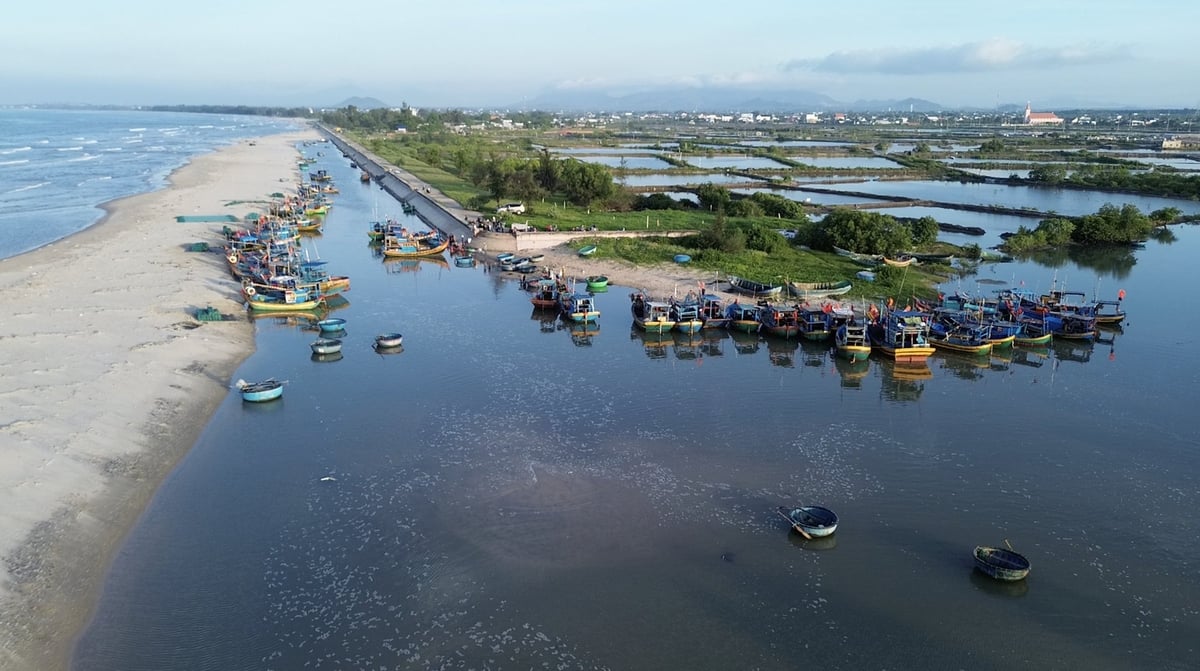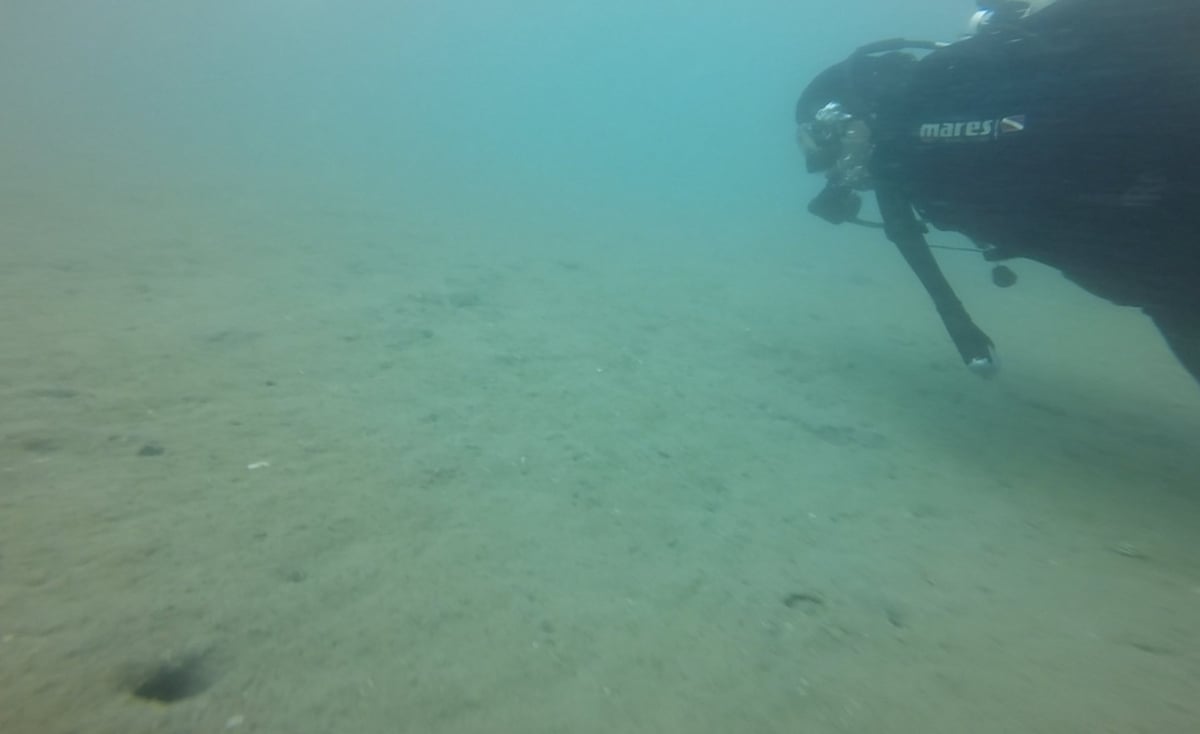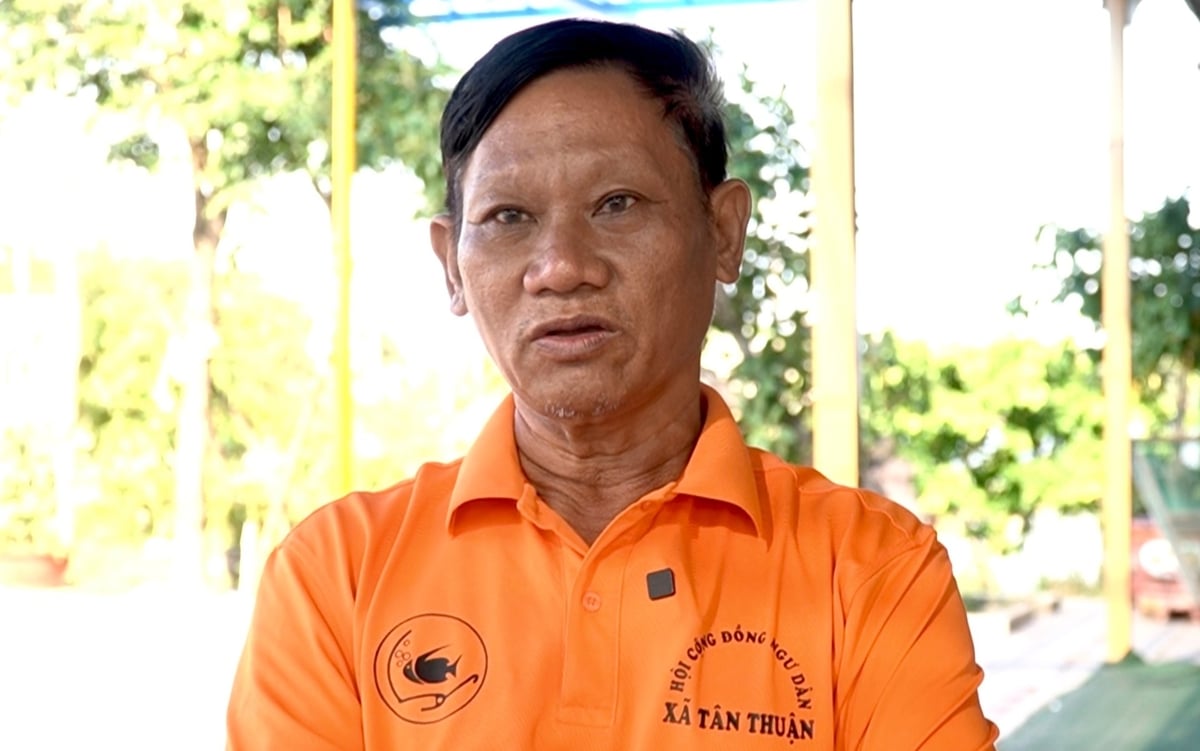November 24, 2025 | 07:40 GMT +7
November 24, 2025 | 07:40 GMT +7
Hotline: 0913.378.918
November 24, 2025 | 07:40 GMT +7
Hotline: 0913.378.918
We visited the Tan Thuan Fisheries Community Association (Tan Thanh commune, Lam Dong province) at a modest roadside shop. The weathered signboard read “Golden sea community house,” with a faded image of Ke Ga lighthouse - a symbol of this coastal land.
Right at the entrance stood the “Cyclo bookshelf.” Most of the books had been borrowed by local children and residents who often brought them home to read. Among the shelves, a letter rested in a place of honor, next to certificates recognizing over a decade of tireless efforts to restore marine resources in the area.
The letter, written by former Minister of Agriculture and Rural Development Le Minh Hoan (now Vice Chairman of the National Assembly), included the following heartfelt lines: “Pioneers always face countless challenges. To me, each member of the community association is like a beautiful flower. You have all chosen a path of dedication - for a better society, for the sustainable development of the country, and your own community and future generations.”

The South Central Coast is one of the most bountiful marine areas in the country in terms of fisheries resources. Photo: Quynh Chi.
The Tan Thuan Fisheries Community Association is widely recognized nationally and internationally. For over 15 years, local fishers have led a persistent journey to restore marine resources, an exemplary model proving that when communities take the lead, they can drive sustainable transformation.
We hadn’t even had a chance to greet everyone when Mr. Thanh, an officer in charge of fisheries inspection, marine and island affairs at the Department of Agriculture and Environment of Lam Dong province, opened the meeting. He took out an envelope meant for the family of a fisherman who had just had an accident at sea. The room fell quiet, and a shared sense of loss was deeply felt.
According to local fishers, life was much harder before the community association was established. There was little common ground with local authorities, leading to complaints and even harsh criticism over ineffective management of fishing activities. Faced with destructive fishing practices, they raised a pressing question: How can we protect marine resources so that the sea still has fish and squid for the future?

Local officials' surveys revealed that demersal fishery resources have been devastated by large fishing vessels engaged in destructive overexploitation. File photo.
Before 2010, the coastal waters were still abundant with fish and shrimp. Every trip offshore brought in full holds and a stable income. But from 2010 to 2018, bottom trawling surged uncontrollably. Large vessels deployed heavy trawl nets that scraped the seafloor bare, not only harvesting blood cockles but also flattening entire marine ecosystems, wiping out fish eggs, juvenile marine life, seaweed, and the very biological foundation of the ocean floor.
“We're old now, and all we wish for is that our children and grandchildren can carry on life at sea and keep the trade alive. Protecting fishery resources isn't just a short-term concern; it's a responsibility to the next generation,” said Vo Viet Tuan, a fisherman with more than 45 years at sea.
Mr. Le Thanh, now in his 60s, once fished as far south as Vung Tau. He would go wherever the fish were, but the farther he went, the more expensive and less rewarding the trips became. He began to wonder: why venture so far when the waters at home were left abandoned and unmanaged?
“I used to haul in hundreds of kilos each night. Then it dropped to just 20 or 30 kilos, if I was lucky. The small fish never had a chance to grow. Bottom trawling leaves nothing behind - it doesn’t just exhaust fishers, it slowly kills the sea,” the old fisherman recalled the golden days of the South Central Coast.

Mr. Le Thanh, a fisherman from Tan Thanh commune, Lam Dong province, has 45 years of experience at sea. Photo: Tran Phi.
In Vietnam, the marine ecosystem of the former Ninh Thuan – Binh Thuan region is recognized as one of the world's unique upwelling zones and has attracted the attention of international scientists since the 1960s.
Upwelling is a unique dynamic process in the ocean in general. This phenomenon brings nutrient-rich deep water to the surface, providing food for marine life. The upwelling zones are often referred as “golden seas” due to their consistently abundant fish stocks.
In the book “Upwelling phenomena in Vietnam's marine areas”, edited by Dr. Bui Hong Long, a team of researchers from the Vietnam Academy of Science and Technology analyzed practical data. Initially, it confirmed the positive impacts of upwelling on marine resources and habitats.
The researchers described the upwelling current as an "underground vein" that nourishes the open sea, creating a favorable living environment and a rich food supply. This natural process helps many marine species achieve higher yields and better quality, making it a priceless gift from nature to humankind.
As of July 1, the commune of Tan Thuan has merged with Thuan Quy and Tan Thanh under the new name Tan Thanh. At the same time, Lam Dong province was newly established through the merger of Binh Thuan and Dak Nong.
During a working visit to the three former provinces in early June, General Secretary To Lam outlined a vision for the newly unified ecological region, where highlands, midlands, and coastal zones converge, unlocking diverse economic potential and shaping a long-term development direction.
The local fishermen understand that every fish and squid they catch is a “gift from nature.” They seek practical actions and effective approaches to help preserve marine resources and end the destructive practice of bottom trawling, which once exhausted the sea.
Protecting abundant fish stocks is a journey shared by the entire community. It is their collective vision for a sustainable, green future that inspires those who love and protect the ocean, as if safeguarding their own lives.
Translated by Phuong Linh
/2025/11/22/4018-4-213342_747.jpg)
(VAN) The Mekong Delta Agricultural Experts Club has attracted 143 experts and researchers to participate in providing consultancy and contributing initiatives to the development of one million hectares of high-quality rice.

(VAN) Ca Mau’s development of OCOP products opens a path to increasing cooperatives value, helping boost income, expand markets, and affirm collective economy's role.

(VAN) Turning seemingly ordinary coconut shells into unique jewelry and artwork, Nguyen Bang Nhi spreads the value of local culture through her brand, Cocohand.

(VAN) Results from the Sustainable Durian Model Project in Dak Lak have confirmed the critical role of Yara Viet Nam in transferring advanced nutritional solutions to farmers.

(VAN) In Tuyen Quang province, livestock farmers have introduced effective models and innovative practices that significantly strengthen African Swine Fever prevention and control efforts.

(VAN) This is the study conducted by IRRI and Can Tho University on the rice straw value chain in Mekong Delta showing an economic potential of more than 6.6 trillion VND/year.

(VAN) By participating in cooperative economics, many farmers in Tay Ninh have overcome hardship, mastered clean dragon fruit cultivation techniques.